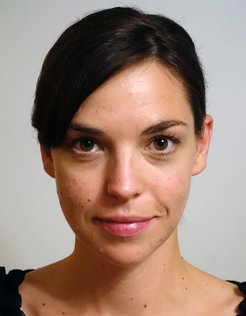Sophia Rudorf is awarded the Michelson Award 2016
Sophia Rudorf, group leader at the Max Planck Institute of Colloids and Interfaces in Potsdam, receives the award for her doctoral thesis on ”Protein synthesis by ribosomes”. She shares the annually presented award of the University of Potsdam with Giovanni Conforti. The prize is endowed with altogether 1,500 Euro. The award ceremony will take place on July 14th.

The Michelson Award appreciates the best doctoral thesis of the academic year at the University of Potsdam. Sophia Rudorf obtained her doctorate degree with "summa cum laude" for her thesis “Protein synthesis by ribosomes“. She completed the dissertation in the field of Theoretical Biological Physics under the supervision of Reinhard Lipowksy (Max Planck Institute of Colloids and Interfaces).
The proverb "life is motion" applies both to the macroscopic and the microscopic world. Indeed, if we looked into any living cell with molecular resolution, we could see that cellular components are constantly created, modified, transported and finally degraded. These dynamic processes are driven by a variety of tiny biomolecular machines. An impressive example for such a process is the synthesis of proteins by ribosomes. The ribosome has a diameter of about 20 nanometers and is therefore a true "nanorobot". During protein synthesis, the ribosome moves along a messenger-RNA, which consists of a chain of codons. A codon is a sequence of three nucleotides that corresponds to a specific amino acid or a stop signal.
Reliable and precise protein synthesis by ribosomes is crucial for all life processes. Not only our cells but also the cells of all other organisms consist mainly of proteins. Some open questions are how ribosomes move along the messenger-RNA, why traffic jams occur or where longer breaks take place, and which influence these events have on protein folding. In her dissertation, Rudorf developed a mathematical algorithm that she combined with known experimental in-vitro data on protein synthesis. "The new method allows elucidating the dynamics of protein synthesis in living cells. This is not only relevant for the investigation of antibiotics. Many diseases arise from genetic mutations, which result in a strongly hampered protein synthesis", explains Rudorf. The new findings could help to understand these diseases and their underlying mechanisms.
Sophia Rudorf studied physics from 2004 to 2007 at the University of Potsdam before she moved to the University of California, Santa Barbara. From 2008 to 2009 she worked at the Ludwig-Maximilians-University Munich for her master’s thesis (Diplom). In early 2015, Rudorf received her PhD in the field of Theoretical Biological Physics at the University of Potsdam. Since then she has been leading a research group in the department of Theory & Bio-Systems.
Michelson Award
The award appreciates an excellent thesis of an outstanding doctoral candidate in mathematics and natural sciences in the academic year. The award was established in honour of the physicist and Nobel laureate Albert Abraham Michelson and is endowed with 1,500 Euro. The prize is awarded with the support of the UP Transfer GmbH at the University of Potsdam. The institutes and the PhD Committee have the right for nominations. Each institute can nominate one candidate.












